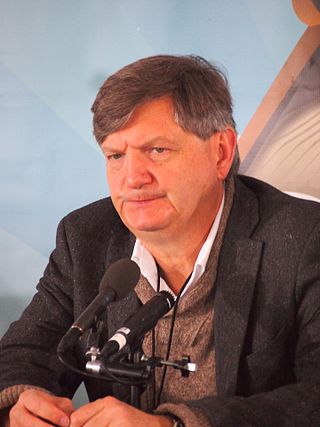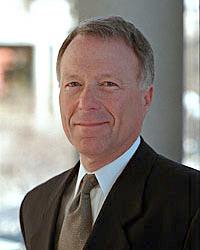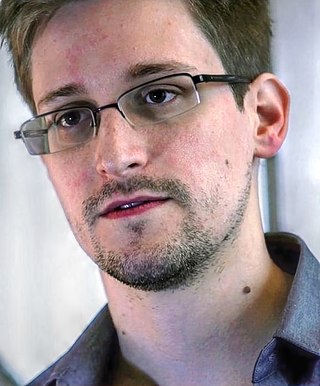
The Espionage Act of 1917 is a United States federal law enacted on June 15, 1917, shortly after the United States entered World War I. It has been amended numerous times over the years. It was originally found in Title 50 of the U.S. Code but is now found under Title 18. Specifically, it is 18 U.S.C. ch. 37
The Plame affair was a political scandal that revolved around journalist Robert Novak's public identification of Valerie Plame as a covert Central Intelligence Agency officer in 2003.
The Lawrence Franklin espionage scandal involved Lawrence Franklin, a former United States Department of Defense employee, passing classified documents regarding United States policy towards Iran to Israel. Franklin pleaded guilty to several espionage-related charges and was sentenced in January 2006 to nearly 13 years of prison, which was later reduced to ten months' house arrest. Franklin passed information to American Israel Public Affairs Committee policy director Steven Rosen and AIPAC senior Iran analyst Keith Weissman, who were fired by AIPAC. They were then indicted for illegally conspiring to gather and disclose classified national security information to Israel. However, prosecutors later dropped all charges against them without any plea bargain.
The CIA leak grand jury investigation was a federal inquiry "into the alleged unauthorized disclosure of a Central Intelligence Agency (CIA) employee's identity", a possible violation of criminal statutes, including the Intelligence Identities Protection Act of 1982, and Title 18, United States Code, Section 793.

The following are controversial invocations of the USA PATRIOT Act. The stated purpose of the Act is to "deter and punish terrorist acts in the United States and around the world, to enhance law enforcement investigatory tools, and for other purposes." One criticism of the Act is that "other purposes" often includes the detection and prosecution of non-terrorist alleged future crimes.

James Risen is an American journalist for The Intercept. He previously worked for The New York Times and before that for Los Angeles Times. He has written or co-written many articles concerning U.S. government activities and is the author or co-author of two books about the Central Intelligence Agency (CIA) and a book about the American public debate about abortion. Risen is a Pulitzer Prize winner.

United States v. Libby was the federal trial of I. Lewis "Scooter" Libby, a former high-ranking official in the George W. Bush administration, for interfering with special prosecutor Patrick Fitzgerald's criminal investigation of the Plame affair.
The Plame affair was a dispute stemming from allegations that one or more White House officials revealed Central Intelligence Agency (CIA) agent Valerie Plame Wilson's undercover status. An investigation, led by special counsel Patrick Fitzgerald, was started, concerning the possibility that one or more crimes may have been committed. The initial focus was on Scooter Libby; however, he was not the primary source of the leak.

Irve Lewis "Scooter" Libby is an American lawyer and former chief of staff to Vice President Dick Cheney known for his high-profile indictment and clemency.

The Classified Information Procedures Act or CIPA is codified as the third appendix to Title 18 of the U.S. Code, the title concerning crimes and criminal procedures. The U.S. Code citation is 18 U.S.C. App. III. Sections 1-16.

Trailblazer was a United States National Security Agency (NSA) program intended to develop a capability to analyze data carried on communications networks like the Internet. It was intended to track entities using communication methods such as cell phones and e-mail.

Thomas Andrews Drake is a former senior executive of the National Security Agency (NSA), a decorated United States Air Force and United States Navy veteran, and a whistleblower. In 2010, the government alleged that Drake mishandled documents, one of the few such Espionage Act cases in U.S. history. Drake's defenders claim that he was instead being persecuted for challenging the Trailblazer Project. He is the 2011 recipient of the Ridenhour Prize for Truth-Telling and co-recipient of the Sam Adams Associates for Integrity in Intelligence (SAAII) award.

Jeffrey Alexander Sterling is an American lawyer and former CIA employee who was arrested, charged, and convicted of violating the Espionage Act for revealing details about Operation Merlin to journalist James Risen. Sterling claimed he was prosecuted as punishment for filing a race discrimination lawsuit against the CIA. The case was based on what the judge called "very powerful circumstantial evidence." In May 2015, Sterling was sentenced to 3½ years in prison. In 2016 and 2017, he filed complaints and wrote letters regarding mistreatment, lack of medical treatment for life-threatening conditions, and false allegations against him by corrections officers leading to further punitive measures. He was released from prison in January 2018.
United States v. Franklin, Rosen, and Weissman was an early 21st century court case from the United States District Court for the Eastern District of Virginia. The government prosecuted one Department of Defense employee (Franklin) and two lobbyists for the American Israel Public Affairs Committee (AIPAC) for allegedly disclosing national defense information to persons 'not entitled' to have it, a crime under the Espionage Act of 1917. It is one of the few Espionage Act cases of its kind, targeted not at traditional espionage or sedition, but at the practice of information leaking in Washington DC. The cases against Rosen and Weissman were also unusual because this aspect of the Espionage act had rarely been used against non-government individuals. Franklin pleaded guilty, but all charges against Rosen and Weissman were dropped.
The silent witness rule is the use of "substitutions" when referring to sensitive information in the United States open courtroom jury trial system. An example of a substitution method is the use of code-words on a "key card", to which witnesses and the jury would refer during the trial, but which the public would not have access to. The rule is an evidentiary doctrine that tries to balance the state secrets privilege with the bill of rights. In practice the rule has been rarely used and was often challenged by judges and civil rights advocates. Its use remains controversial.

Edward Joseph Snowden is an American and naturalized Russian citizen who was a computer intelligence consultant and whistleblower who leaked highly classified information from the National Security Agency (NSA) in 2013 when he was an employee and subcontractor. His disclosures revealed numerous global surveillance programs, many run by the NSA and the Five Eyes intelligence alliance with the cooperation of telecommunication companies and European governments and prompted a cultural discussion about national security and individual privacy.

Ongoing news reports in the international media have revealed operational details about the Anglophone cryptographic agencies' global surveillance of both foreign and domestic nationals. The reports mostly emanate from a cache of top secret documents leaked by ex-NSA contractor Edward Snowden, which he obtained whilst working for Booz Allen Hamilton, one of the largest contractors for defense and intelligence in the United States. In addition to a trove of U.S. federal documents, Snowden's cache reportedly contains thousands of Australian, British, Canadian and New Zealand intelligence files that he had accessed via the exclusive "Five Eyes" network. In June 2013, the first of Snowden's documents were published simultaneously by The Washington Post and The Guardian, attracting considerable public attention. The disclosure continued throughout 2013, and a small portion of the estimated full cache of documents was later published by other media outlets worldwide, most notably The New York Times, the Canadian Broadcasting Corporation, the Australian Broadcasting Corporation, Der Spiegel (Germany), O Globo (Brazil), Le Monde (France), L'espresso (Italy), NRC Handelsblad, Dagbladet (Norway), El País (Spain), and Sveriges Television (Sweden).
Harold Thomas Martin III is an American computer scientist and former contractor for Booz Allen Hamilton who pleaded guilty to illegally removing 50 terabytes of data from the National Security Agency. The United States government reportedly failed to note or effectively respond to a number of issues with Martin's security practices and behaviors over a period of 10 to 20 years. The motive for the crime has been a subject of debate, investigators reportedly had difficulty determining if Martin was engaged in conventional espionage or digital hoarding since throughout his decades of work, he appeared not to have ever accessed any of the files once he removed them from government facilities.

Reality Leigh Winner is an American U.S. Air Force veteran and former NSA translator. In 2018, she was given the longest prison sentence ever imposed for an unauthorized release of government information to the media after she leaked an intelligence report about Russian interference in the 2016 United States elections. She was sentenced to five years and three months in federal prison.

Joshua Adam Schulte is a former Central Intelligence Agency (CIA) employee who was convicted of leaking classified documents to WikiLeaks. WikiLeaks published the documents as Vault 7, which The New York Times called "the largest loss of classified documents in the agency's history and a huge embarrassment for C.I.A. officials." After his conviction, the Department of Justice called it "one of the most brazen and damaging acts of espionage in American history."











